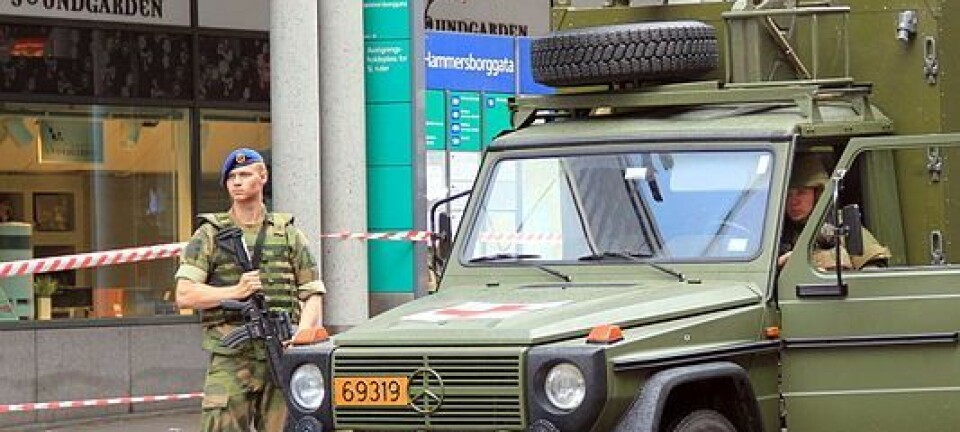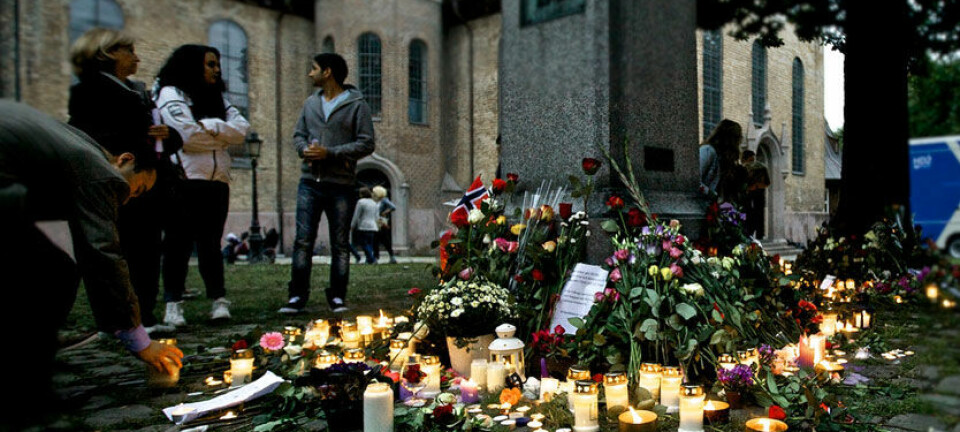
Researchers help municipalities prevent terrorism
Radicalism and violent extremism have become a problem for some Norwegian municipalities. But many communities do not know what to do.
Denne artikkelen er over ti år gammel og kan inneholde utdatert informasjon.
From its booming capital, Oslo, to midsized Larvik, with its 41,000 residents, a number of Norway’s cities and towns face problems with radicalisation. A new research project will look at the challenges that these and 29 other municipalities must confront to prevent extremism.
The Norwegian Police Security Service (PST) says there is reason to be concerned about Islamist extremists, right-wing radicals and anti-Islamic environments that are found in a number of Norwegian municipalities.
“Even people who grew up in our neighbourhoods, have gone to school with our children or who may have sat on a porch near you, can end up filled with hatred,” said Justice Minister Anders Anundsen at a political summit held 2 February on the prevention of violence and extremism.
But according to a survey conducted by Aftenposten, one of the nation’s largest newspapers, only a handful of municipalities have initiated measures to prevent radicalisation, seven months after the Norwegian government set out its action plan.
Global situation, local challenges

Now researchers at the Norwegian Institute for Urban and Regional Research (NIBR) and the Norwegian University of Life Sciences (NMBU) have started a research project that looks at the challenges Norwegian municipalities face in preventing extremism.
And the challenges are great, says the Norwegian Association of Local and Regional Authorities (KS), which is helping to fund the research.
Even though the issue is a global one, “municipalities and local groups are very important in prevention efforts,” said Yngve Carlsson, a special adviser for KS when he presented the project at the summit meeting held in February.
Figuring out what municipalities can do
NIBR researcher Susanne Søholt is the project manager. She has gathered people from 31 municipalities to talk about issues and share experiences with identifying, managing and preventing radicalisation.

The project will hold a total of three development workshops, in part to allow researchers to collect data. The researchers will also delve deeper into five municipalities that have already acknowledged they have a problem.
The researchers will point out the kinds of dilemmas municipalities face, and possible roles they can play in preventing violent extremism. What can they actually do? What should they do, and with whom should they cooperate?
Søholt says municipalities find this problem very challenging, and they all say they need to know more.
“There is considerable variation between the different municipalities,” she says. “But one thing they have in common is that they need more knowledge, about the phenomenon itself and about when they should intervene, and how.”
Sarpsbord has made progress
Even people who grew up in our neighbourhoods, have gone to school with our children or who may have sat on a porch near you, can end up filled with hatred.
Sarpsborg has been identified as having problems with radicalisation. Tone Faale, who is head of Sarpsborg’s Coordination of Local Crime Preventive Enterprises (SLT), says she is grateful that Sarpsborg has been chosen as one of the case municipalities for the researchers’ project.
The municipality is as focused on the extreme right as on radical Islamists, she says. The effort began after the 22 July 2011 terrorist attacks in Oslo and Utøya.
Representatives from the five mosques in Sarpsborg, the Norwegian Church, the Methodist Church and the Church City Mission now meet regularly. The churches and mosques have been opened to each other. People have become better acquainted with each other and have gained mutual respect, Faale says.
UN issues in a small city
It may sound simple. But Faale says that it is quite complicated.
“It is demanding to work with big issues such as inclusion, extremism, human rights, sharia law, and religious and political questions,” she said. “But actually, we work locally with most of the major international issues facing the UN.”
Sarpsborg also created a preparedness team that can be contacted early.
“It is important that key groups such as the kindergartens and schools, the Norwegian Labour and Welfare Administration, and child protective services have a phone number to call,” Faale said. “There are not many rebel fighters from Østfold County, but the number is still to be reckoned with. What is very important in going forward is to prevent people from feeling like they are outsiders, and to identify and support adolescents early on who are at risk of being radicalised.”
----------------------
Based on an article by Siw Ellen Jakobsen, which can be read in Norwegian at forskning.no

































